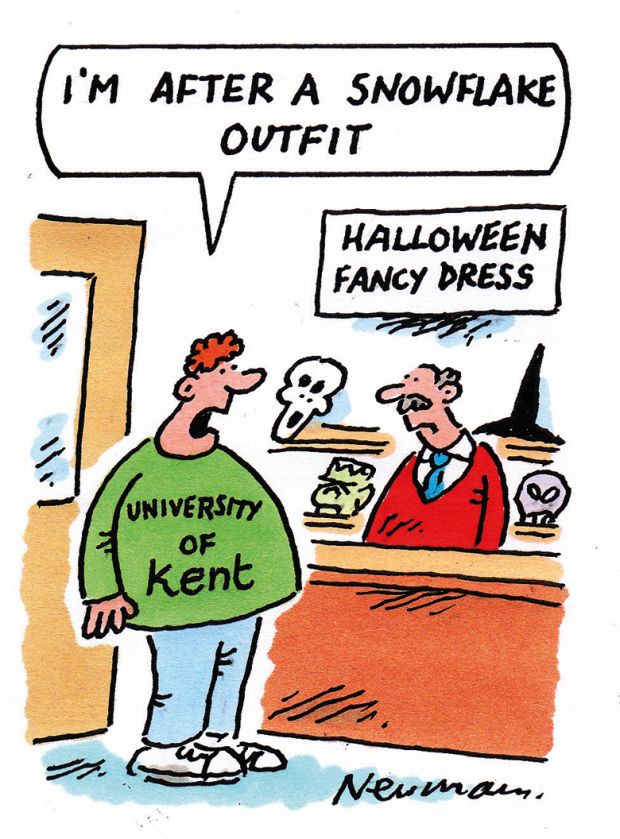
Nearly 50,000 European Union nationals working in UK universities will be prioritised if they apply for settled status in the UK after Brexit, the Home Office has said. Announcing details of a pilot scheme to fast-track certain workers for settled or pre-settled status on 11 October, the Home Office said that university staff would be able to apply for residency from November and would have their applications prioritised. The seven-week pilot will test the online application process that will be used by about 3.5 million EU nationals living in the UK. Not to give EU nationals any more to worry about, but the scale of the enterprise and the history of the Home Office suggests that applicants should be wary about the “fast” element in the phrase “fast track” – and maybe the “track” bit, too.
Conflicting rallies preceded the start of a crucial court case that will decide “whether Harvard has for years racially balanced its classes and discriminated against Asian-American applicants”, The New York Times reported on 14 October. A protest in Boston featured “older Asian-Americans” who see “race-conscious admissions as a slap in the face to their work ethic and pursuit of the American dream of upward mobility”, while a demonstration nearby in Cambridge, Massachusetts, was made up of people who “came to the defense of diversity efforts and a university intent on maintaining them”. The plaintiffs in the case “say admissions officials stereotype Asian-Americans as faceless, textureless grinds who work hard but lack exceptional qualities”, The New York Times said.
There was an update this week on a previous item in the seemingly never-ending series that makes up an increasingly significant proportion of British newspaper coverage: “things that students’ unions do that some newspapers think are stupid”. The Times’ Corrections and Clarifications column said on 13 October that the newspaper had previously “reported that Manchester University students had passed a motion to ‘swap audible clapping out for [British Sign Language] clapping at [students’ union] events’…Since publication of our report the Manchester students’ union has clarified that it will not be banning audible clapping and that the motion to adopt British Sign Language ‘jazz hands’ will apply only to a minority of union events.”
But awareness of the national media’s insatiable appetite for students’ union stories appears not to have been sufficiently deep in the Garden of England. Cowboy hats and sombreros are among the items listed as unacceptable in guidance on fancy dress from the University of Kent’s students’ union, the Metro reported on 12 October. “Dressing up as a particular race, culture or stereotype is offensive and Kent Union will not tolerate behaviours which seek to,” said Kent Union. Also on the list of unacceptable stereotype dress were “Isis bombers”, “Israeli soldier” and “Tory Boys”. Kent Union thus offered up the latest tasty course in the bottomless buffet that is the “snowflake student” narrative and generated plenty of headlines. The union subsequently said in a statement: “Whilst speaking to some of our student groups we reminded them to be mindful of their choice of fancy dress to ensure an environment which is safe, inclusive and non-discriminatory. The guidelines that are being reported on are a working document in its draft stages and one which we will be continually reviewing.”
“A Cambridge don who conned the government out £2.3 million in a green-energy swindle is facing years behind bars,” the Daily Mail reported on 12 October. “Ehsan Abdi-Jalebi, 37, was caught with £100,000 in cash in a Thornton’s Continental chocolate box as he was boarding a flight to Tehran from Heathrow airport.” The former Churchill College fellow – reported to have lost that post after his arrest – “stashed £50 notes into his luggage every time he flew home to Iran but border officials became suspicious after repeatedly finding money in his luggage” (however, did they guess that he wasn’t an ordinary academic?). He admitted 13 counts of forgery but denies one count of perverting the course of justice, in a case reported to relate to government and EU grants to his firm, Wind Technologies. The Mail said that “Abdi-Jalebi won international acclaim for his work on wind turbines and set up his technology firm in 2006” – but clearly that was not sustainable.